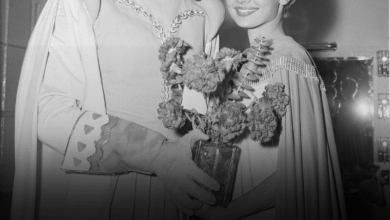Audrey Hepburn’s Career and Life Struggles Hold the Key to Smart Financial Planning—Here’s What You Need to Know
OPINION: This article may contain commentary which reflects the author's opinion.
Audrey Hepburn, the beloved actress and humanitarian, continues to be an icon not just for her acting talent but also for the way she lived her life. Known for classic films such as Roman Holiday, Breakfast at Tiffany’s, and My Fair Lady, Hepburn’s career was filled with high points—yet, it’s the way she navigated financial challenges and gave back that can provide valuable lessons in financial management. While she didn’t offer direct financial advice, her life and career offer clear insights into prudent financial practices.
This analysis distills key financial management rules inspired by Hepburn’s life, from her estate planning struggles to her philanthropic efforts and career transitions. These rules emphasize planning, generosity, adaptability, and balancing work with personal life—principles that continue to resonate today.
1. Clear Estate Planning to Prevent Disputes
Hepburn’s estate planning is a cautionary tale for financial management, illustrating the importance of clear communication when distributing assets. Upon her death in 1993, her will left personal memorabilia to her two sons in equal shares, but it lacked specificity about which items each son would receive. This ambiguity led to a lengthy legal dispute that lasted for over two decades, finally resolved in 2017 through mediation.
Lesson: To avoid similar issues, it’s vital to provide clear instructions about the distribution of personal assets. Ensuring that your will specifies the allocation of both sentimental and valuable items can prevent costly and emotionally taxing family disputes. A signed and dated memorandum for low-value items, requiring mediation in the case of disagreements, and considering selling disputed property with proceeds shared equally are all helpful strategies for clearer estate planning.
Supporting Evidence: LifePath highlights Hepburn’s estate dispute and offers practical advice on estate planning.
2. Prioritizing Generosity and Philanthropy
Audrey Hepburn’s career was balanced not just by wealth, but also by her profound commitment to giving back. After achieving international fame, she spent her later years as a UNICEF Goodwill Ambassador, dedicating herself to helping children in impoverished regions of Latin America and Africa. Hepburn’s financial success, including an estimated net worth of $55 million at the time of her death (approximately $100 million in today’s value), did not deter her from allocating significant time and resources toward humanitarian causes.
Lesson: Financial management should include a plan for philanthropy. Allocating resources toward charitable causes and leaving a lasting legacy of kindness and generosity can bring fulfillment and contribute to the greater good. Hepburn’s career proves that wealth is not just for personal accumulation, but also for creating a positive societal impact.
Supporting Evidence: Hepburn’s philanthropic endeavors are detailed in RachelParris.com, which outlines her financial legacy and charitable contributions.
3. Diversifying Income Streams and Career Paths
Hepburn’s career is a textbook example of diversification. Starting as a ballet dancer and model, she transitioned into acting, where she solidified her place in cinema history. Later in life, she turned her attention to humanitarian work, helping children worldwide. These shifts illustrate the value of adapting to new opportunities, a principle that also applies to financial management.
Lesson: Diversify income sources to ensure financial stability, particularly during career transitions or economic uncertainty. Hepburn’s ability to pivot from entertainment to philanthropy shows the importance of adaptability in financial planning.
Supporting Evidence: Hepburn’s multifaceted career is well documented in her Wikipedia biography and various film retrospectives.
4. Preparing for Emergencies and Hardships
Hepburn’s experiences during World War II left a lasting impression on her financial mindset. As a child in Nazi-occupied Holland, she endured malnutrition, financial instability, and the trauma of war. These hardships likely informed her later financial resilience, teaching her the importance of financial preparedness.
Lesson: Building an emergency fund and ensuring financial resilience during crises is essential. Hepburn’s wartime struggles emphasize the need to plan for unexpected hardships, such as job loss, economic downturns, or global events.
Supporting Evidence: Britannica and IMDb both highlight Hepburn’s war-time experiences and how they shaped her personal and financial life.
5. Balancing Career and Personal Life
Hepburn’s decision to slow down her career to focus on family in the 1970s and 1980s shows that financial planning isn’t just about accumulating wealth—it’s also about managing work-life balance. After marrying Andrea Dotti in 1969 and having her son Luca, Hepburn took fewer acting roles to prioritize her family. Later, her focus shifted to UNICEF, demonstrating a shift away from financial gain toward personal fulfillment and societal impact.
Lesson: Financial planning should take into account personal fulfillment and relationships. Balancing career ambitions with family and life priorities ensures long-term happiness and stability. Hepburn’s life shows that wealth isn’t the only measure of success—living a balanced life with meaningful relationships is equally important.
Supporting Evidence: The List and IMDb offer insights into how Hepburn’s later life was focused on family and humanitarian work, underscoring the importance of personal happiness in financial decisions.
Conclusion: Audrey Hepburn’s Financial Wisdom
Audrey Hepburn’s legacy extends far beyond her film career and humanitarian work—it offers a blueprint for financial management that prioritizes clear planning, generosity, diversification, resilience, and balance. By observing how she navigated her finances and life choices, we can learn valuable lessons in wealth management that not only preserve assets but also build a meaningful legacy. Hepburn’s approach to money was never about excessive accumulation but rather about using wealth as a tool for positive impact, personal growth, and enduring happiness.



